PRINCETON, NJ -- Americans say being inspiring is an important presidential quality, but when forced to choose, they would rather see a president elected in 2008 who is a tested leader, but not inspirational, than a candidate who is inspiring but not a tested leader. Most Republicans opt for electing a tested leader, while Democrats are evenly divided. Among the four leading Republican and Democratic presidential candidates, Barack Obama is most often rated as being inspirational, while John McCain is the runaway leader for tested leadership.
The Jan. 10-13 poll finds that 71% of Americans say it is "very important" for a president to be inspiring; an additional 23% say it is "somewhat important." Similar percentages of Republicans, independents, and Democrats believe it is important to have an inspirational president.
Even though Americans value having an inspiring president, they give higher priority to a leader who has been tested when asked to choose between two hypothetical candidates as defined by these two dimensions. Fifty-two percent of Americans say they would prefer the 2008 presidential election winner to be "a candidate who is a tested leader but who is not that inspiring" while 43% say it would be better to elect "a candidate who is inspiring but who has not been tested as a leader."
Republicans show a strong inclination toward a tested leader: 60% think this is more important for the next president than being inspiring, while 33% think the opposite. Democrats are evenly divided, with 49% preferring an inspirational leader and 49% preferring a tested one. Independents show a slight preference for a tested leader.
There is a definite link between Democrats' and Democratic leaners' preference for an inspirational versus a tested leader and their current choice for their party's presidential nominee. Among Democrats who place a higher value on inspiration, Obama is the easy favorite. In turn, Democrats who believe it is better to elect a tested leader show an even greater preference for Hillary Clinton.
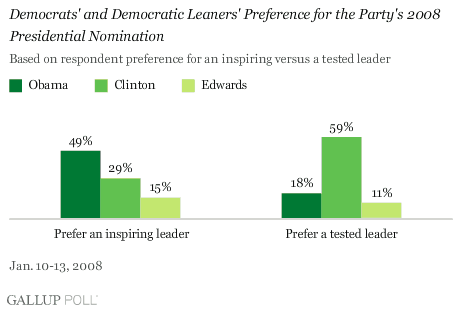
Republicans' and Republican leaners' nomination preferences do not show variation by respondent preference for an inspiring versus a tested leader.
The 2008 Candidates as Inspiring and Tested Leaders
The poll assessed how the current leaders for both parties' presidential nominations stack up on the two dimensions. Republican McCain is most likely to be viewed as a tested leader, with 72% of all Americans saying he fits that description. A majority also say this applies to Clinton, but only about one in three believe Obama and Mike Huckabee have been sufficiently tested as a leader.
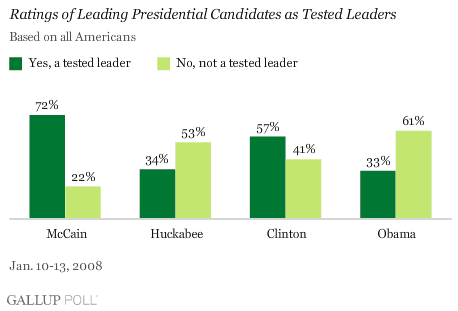
Obama's seeming lack of experience is countered by his perceived inspirational qualities. Sixty-nine percent of Americans believe he is inspiring, far more than say this about any of the other presidential candidates. About half of Americans believe Clinton and McCain are inspiring, and only 35% say Huckabee is.
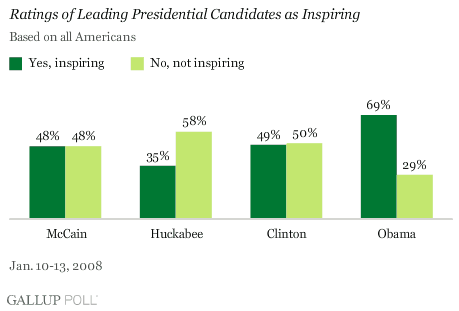
In general, Republicans and Democrats rate their own party's candidates higher than the other party's candidates on both dimensions -- particularly when it comes to their party's front-runner. But Republicans are more likely to rate Obama than Huckabee as inspiring, and Democrats are more likely to view McCain than Obama as being a tested leader. Democrats give Obama only a slight edge over Clinton on inspiration (78% to 72%), his supposed strong suit.
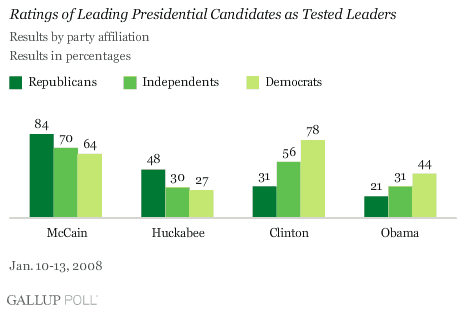
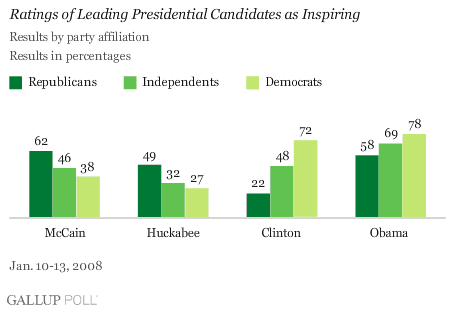
Implications
Obama's message of hope and unity has certainly attracted a lot of attention and support among Democrats in this campaign, but in the general election, his lack of experience may be viewed as a liability by an electorate that is placing a somewhat higher value on putting a tested leader in the White House.
Survey Methods
These results are based on telephone interviews with a randomly selected national sample of 2,010 national adults, aged 18 and older, conducted Jan. 10-13, 2008. For results based on this sample, one can say with 95% confidence that the maximum error attributable to sampling and other random effects is ±2 percentage points.
Interviews are conducted with respondents on land-line telephones (for respondents with a land-line telephone) and cellular phones (for respondents who are cell-phone only).
In addition to sampling error, question wording and practical difficulties in conducting surveys can introduce error or bias into the findings of public opinion polls.
